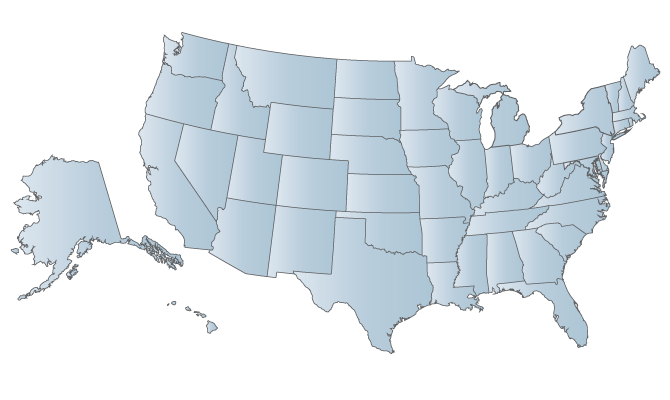Apply For A Building Permit
A building permit is required by almost every city or county in the United States in order to construct or alter a building or structure. Most states require that all construction work on a building that requires a permit also be done by a licensed contractor. Some states allow an exemption, however, for homeowners who build or make improvements for their own personal residence. Apply for a building permit now by finding your state using the map below.
The first step is to obtain the proper application from the city or county in which you wish to build or make improvements. If you live in an incorporated city, then you would likely apply with your city building department. However, if you live in an unincorporated town, you likely would apply for a permit with the county building department. In some areas, the city and county are one and the same entity.
Search by State
To find more information about a building permit in your state choose the state below.
Applications sometimes differ by the type of construction that will be taking place, and some jurisdictions have a universal permit application. The different kinds of applications that are customary include the following:
• New Buildings (Residential or Commercial)
• Alterations and Improvements
• Swimming Pools, Spas, and Decks
• Storage facilities, barns, and temporary structures
The building permit application will usually require
you to submit the following:
• A fee
• A set of building plans
• A set of material specifications
• A description of the project, including its location
• Anticipated costs of the project and how it will be
financed
• Soil tests, structural engineer analysis, or environmental
assessments
• The general contractor for the job and their license
number
• Proof of insurance or bond
• Your personal information, social security number,
or federal tax identification number
The building and site plans will generally require the following:
• Structural drawings, with dimensions and elevations
• Site plan with setbacks, zoning specifications and
grading, drainage and access
• Floor plans for the structure
• Electrical, Plumbing and HVAC plans
• Landscaping
Engineering data and plans, as well as architectural plans usually require the signature of professionals that the plans and drawings meet applicable legal requirements.
The building permit must be submitted and then it must go through the permitting process. The land use or zoning department will review the site plans for compliance with the local land use ordinance to make sure the structure is being built in a properly zoned area, that it meets the minimum height requirements and setbacks (the minimal distances between structures and the property line), and lot coverage, density and parking ratios. This department or a related one also reviews grading, drainage, and public access. If your plans do not meet the ordinance, some jurisdictions allow you to apply for a variance, which is an exception to the rule based on local guidelines or where the local ordinance allows for degrees of discretion.
The local building departments will run the plans through their construction experts or will contract with outside consultants to review the plans. These experts must review the plans for compliance with the local building code for safety and system requirements, such as electrical, sewer, and structural soundness. Like most phases of the building permit process, if the application is rejected, you may be allowed to amend or you can seek an appeal with the local appeals board.
Once the plan and site review is done, the city may, unless other special circumstances exist, issue the building permit. However, most buildings also require additional permit for various aspects of the construction, such as electrical permits, HVAC permits, plumbing permits and sewer hook up fees, or gas lines and tank permits. The city will normally issue a list of conditions for a project that must be met before final inspection will be approved. On large projects these letters of conditions can be quite large and may include such things as adding streets, sidewalks, water tanks, additional sewage facilities, or street lights, and can be very costly.
Once construction is under way, there will be various inspection points by different city or county agencies to determine if code compliance is being met. Health and environmental divisions of the local jurisdiction may inspect the sewer installation, and engineering departments may inspect foundations, sidewalks, or retaining walls. Soil experts may inspect soil for compaction. All electrical, gas, plumbing and HVAC work will require inspections. Then there will be the general inspections to the structure, with the last inspection resulting in a certificate of occupancy or other type of occupancy permit that allows the structure to be used by the public.
A building permit application approval process can be as quick as 30 days or as long as a year, depending on the project and the city or county’s capacity. Building permits usually have expiration dates and work must be started and completed within a given time frame before extensions must be requested.
Search by State
To find more information about a business license in your state choose the state below.
This site is for informational purposes only and does not constitute legal, financial or tax advise. The information on this site should not be relied upon as an official source of information and should be independently verified.





